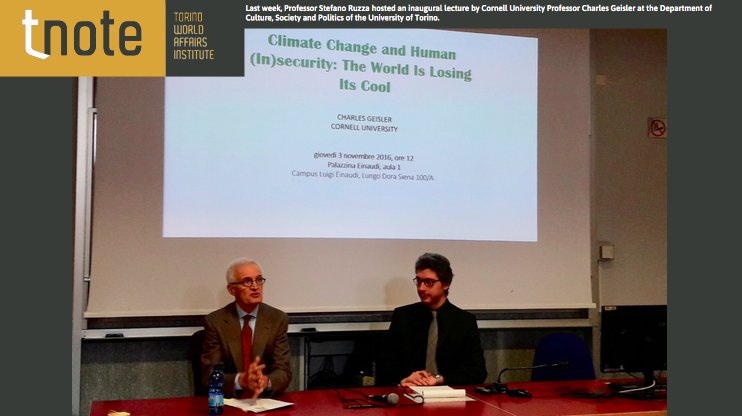
Better Angels of Our Nature?
Given world press coverage of entrenched violence across societies, it is remarkable that some scholars see a long-term reduction in human conflict (e.g. Chapelle, 2010; Pinker, 2011; Goldstein, 2012; Pinker and Goldstein, 2016). They inform us with empirical support that human motivations and inclinations are changing, that civilizing forces are outpacing what Hobbes saw as indelible violence in human nature, and that, implicitly, the future promises more altruism, cooperation, and ‘de-othering’ behaviors. These assessments are relevant to researchers interested in human security at all scales, to policy and peace makers, and to any community consigned to persistent violence and insecurity.
Is global climate change (GCC) a game-changer, an impersonal source of violence with ultra-personal consequences? More than one scholar has characterized GCC as ‘World War III’ and suggested that its collateral damage will include new levels of human havoc and harm that belie the end-of-violence thesis. This brief piece considers the potential of GCC as a source of new bedlam, social dysfunction, and conflict unforeseen in the optimistic assessments just mentioned. I share research findings from Africa that give added meaning to the trop of climate change as an ‘inconvenient truth’, that is, a foil to peace proliferation and related human security. I conclude with brief thoughts on lessons Africa might share with the world to counter intensifying GCC.
Africa Agonistes
Agonistes, the name John Milton gave to the biblical Samson, could apply to Africa as that continent confronts radically altered climate conditions. Africa survives on agriculture, the source of 64 percent of its employment. On top of neocolonialism, recurring epidemics, resource plunder, deep ethnic divisions, global land grabs, civil wars and weak-state circumstances, African farmers confront mounting weather woes and related sea level incursions. Though Africa contributes little to GCC (deforestation being the exception), the physical effects of climate change there are likely to be among the most severe on the planet due to problematic adaptive capacity. Worst-case sea level rise projections put 70 million coastal Africans at risk by 2080, up from one million in 1990. Many interior farmers will be plagued by extreme and unpredictable weather oscillations.
There is mounting evidence that Africa’s climate change will not be a ‘silent tsunami’ with amicable outcomes. On the contrary, Africa will be the poster-child for World War III—a brutal and extended skirmish that will erupt in countless small-scale conflicts. Though these may not register in the statistics of the authors cited above nor be declared as ‘war’, they will contribute to morbidity, mortality, and profoundly violent social dysfunction that by any other name constitute belligerence. In fact, the eruption is already well along.
According to the Social Conflict in Africa Database (SCAD) based at the University of Texas-Austin, severe climate changes are exacerbating other challenges haunting Africa and igniting violence across the continent. Consider what the Fourth Assessment of the Intergovernmental Panel on Climate Change reported on background water stress in Africa: 25 percent of its population experiences such trauma today and half a billion Africans will be at risk of high water stress by 2050. SCAD researchers examined some 6,000 instances of social conflict over 20 years, correlating them with growing weather variability (deviations from normal rainfall patterns). The variability, clearly made worse by GCC shocks, has a significant effect on large- and small-scale political conflict and violence. Violent events—riots, communal violence, factional conflict—are worst with heavy rainfall, as is civil war and insurgency; it appears that violent actors are less likely to launch campaigns when there are severe water shortages and less vegetative cover for hiding. During severe and prolonged drought, people resort to bare survival at the expense of social order. Too much rain, alternatively, impairs infrastructure and limits state ability to contain violence. Simply put, peace in Africa is weather dependent (Hendrix, 2012).
We must reframe future violence in Africa and elsewhere or be lulled into thinking that human belligerence is becoming obsolete. GCC is changing the terms of reference for the planet as a whole. It’s combined terrestrial and marine effects point to a simple fact: more people will inhabit less land and less fertile land. To make matters worse, GCC in Europe, the United States, and China is prompting their elites to purchase African land, making Africa’s land shortage more acute. Predictably, refugees turned away from other countries will eventually be warehoused in Africa, even as the continent’s population grows. In a word, Africa’s living space is shrinking, and its coastal refugees will encounter barriers to entry–hardened national borders; degraded interior lands; exclusionary ownerships, and the no-man’s lands of internal wars–as they seek human security further inland.
Beacon Africa
Africans may instruct others on how to survive and recover from GCC trauma and ‘warfare.’ This is unlikely to be accomplished by costly infrastructure or geo-engineering. Rather, the ‘better angels of our nature’ are a non-trivial part of many African cultures, statutes, and individual value systems. Africa’s time-honored humanity and hospitality may prove resilient. Moreover, the frequent charge that Africa is “underdeveloped” may be a blessing. Less than other regions, Africa has not come to rely on carbon-capitalism (or socialism), continuing instead to depend on solar power: sun-based agriculture, tourism, and low-carbon energy. Africa is doing its fair share to keep the world at less than 20 C above pre-industrial levels. Finally, many African victims of violence have exhibited agency in recovering from civil wars, for example, in peace and reconciliation commissions, in proactive peace-keeping by the African Union, and in the florescence of civil society networks under some of the harshest social conditions, repressive states, and environmental adversity on earth. Africa agonistes is real and made worse by GCC, but so do countervailing trends and counter-factual histories which give hope that Africans can survive and inspire others.
Download


Copyright © 2024. Torino World Affairs Institute All rights reserved
